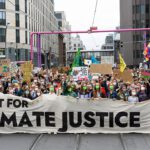by Marine Boutine and Ricarda Faber
This year’s United Nations Framework Convention on Climate Change (UNFCCC) Conference of the Parties (COP) will focus on the perspective of Small Island Developing States (SIDS) and the issue of climate justice. This paper examines the relationship between environment and colonialism and argues that contemporary colonialism is still being reflected in today’s battle for climate justice. By evaluating the developed world’s attitudes towards solutions for combating global warming issues, we argue that the Global South and the Indigenous Peoples are more vulnerable and disproportionately more affected by the impacts of climate change and how these are examples of environmental colonialism.
This paper is part of an interactive project taking place at the “Conference Of the Youth” (COY13) in Bonn on 02.11. – 04.11.17. COY13 is a key preparatory event for YOUNGO members participating in this year’s UNFCCC COP23 climate negotiations held in Bonn.
Category: decoloniality
“Never Hide” – An Animation
by Zoë Rachel Schütte
(Article in German Language)
Wissenschaftliches Arbeiten ist nicht objektiv. Als Produzentin von Wissen fließt meine Sozialisierung in das Produkt mit ein. Sich dessen bewusst zu sein und aktiv darauf hinzuweisen, ermöglicht die Hinterfragung postkolonialer Machtstrukturen. Das Projekt „Never Hide“ thematisiert in Form einer Animation den Konflikt zwischen Möglichkeiten und Grenzen bei dem Versuch der Vermeidung von Reproduktion jeglicher Machtverhältnisse. Angefangen bei einem Ungleichgewicht in der Wahrnehmung der Wissensproduktion, die der westlich-akademischen Literatur einen höheren Wert zuzusprechen scheint, versteht sich die Auswahl der Form und Umsetzung des Projektes bereits als kritischer Gegenentwurf. Die Projektbeschreibung befasst sich mit dem Entstehungszusammenhang und -prozess, Verbindungen zu theoretischen Überlegungen postkolonialer Diskursanalyse von Gayatri Chakravarty Spivak sowie einer Interpretation der Animation und ihrer Aussagekraft.

